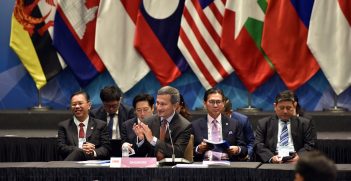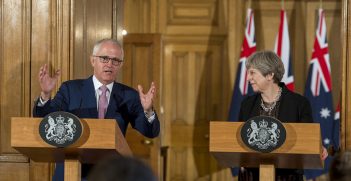Turkey – A Phoenix Rising

In the early 20th century, many observers had labeled Turkey as Europe’s “Sick Man.” More recently, Turkey has made an astounding comeback on the international stage.
Coincident with the resurgence of Turkey’s regional power is the growing Islamisation of the Turkish state and the success of Recep Tayyip Erdogan’s Justice and Equality Party (AKP). The weakness of a shattered Ottoman Empire after World War One by the 1919 Treaty of Versailles has given way to a wave of neo-Ottomanism in the 21st century. Turkey’s influence on the region is not about to wane.
The strategic geographical location of Turkey has long been a source of its strength. It has also historically been a reason for its neighbors to covet its territory, rich in agricultural products, seaports, and industry. Turkey is located in a dangerous part of the world, with one foot in the South Caucuses and the other in the volatile Middle East. Its major trading partner is Europe, and hopes of integrating Turkey into Europe have faded with the European Union membership expansion and more recently Brexit. The enlarged European Union, minus the United Kingdom, opposes Turkish membership pretexting the Kurdish issue and human rights. For many, the actual basis for the rejection is on religious grounds, while Greece remains a regional foe with conflicts in Cyprus and the offshore gas fields. Europe is also important for Turkey’s social and economic stability as many guest workers send remittances back home, representing a net income for many Turkish blue-collar families.
Despite the firing of the Turkish Central Bank President in November, ostensibly due to the sliding lira, the Turkish economy has many positives: a large agricultural and industrial base, a dedicated and energetic work force with lower costs, strong domestic demand, and a balance of payments not unlike most of its European neighbors. Savings are encouraged by high interest on domestic savings and a devalued lira helps decrease spending on imported products. President Erdogan has always blamed the West for any conspiratorial move to increase interest rates on loans. In fact, the main weakness in the Turkish economy might well be the questionable stewardship of President Erdogan himself.
The new Turkey has increased its regional power by supporting the UN-backed Government of National Accord in Libya against the Russian-, Egyptian-, and French-backed opposition. It has sent military advisors and equipment to Tripoli, including some Syrian proxy fighters. Using the same formula, recent clashes in the South Caucuses between Azerbaijan and Armenia have ended in victory for the Turkic-speaking Azeris, who took back militarily parts of their territory lost to Armenia in the 1992 war. Turkish support for Baku has resulted in Ankara having significantly more influence in the South Caucuses. In Syria, the Turks have managed to turn a possible debacle into a stalemate with Bashar al-Assad and his Russian and Iranian allies by securing its influence and that of the remnants of the Syrian opposition in Northern Syria and amongst Syrian Turkmen. this is despite stern criticism on the home front for what is sometimes perceived as an Islamist AKP Syrian adventure. Again, as in the Nagorno- Karabahk situation, the Turks have managed a stellar diplomatic performance getting the Russians to work through the Astana Group, which also includes Iran, and behind the scenes in the Minsk Group to support Azeri allies against Armenia.
No one knows how long Turkey will be able to manage diplomatic relations with Russia given their multiple regional disagreements. After all, Turkey is still a member of NATO, although that organisation has been cast in the shadows during the past four years of Donald Trump’s presidency. The Turkish flirtation with Russia is meant to insist on an independent foreign posture while acknowledging the present downgraded state of NATO.
The question of how President Erdogan will work with President-Elect Biden is vital. If Biden chooses Susan Rice as secretary of state, we might observe a return to America’s dubious “leading from behind” foreign policy during the Obama years. Nothing would be more welcome for the Turks than having a free hand in the region to expand their neo-Ottoman political philosophy. On the other hand, if Biden opts for a renewal of links with America’s traditional allies and pushes forward pro-democracy and pro-Kurdish issues, Turkey may find itself in deeper diplomatic waters. Turkey has no natural allies in America capable of silencing the human rights and Armenian lobbies.
The Turkish resurgence is accompanied by rising interest in Islam and its export abroad. The AKP came to power with a soft-Islamist agenda and has since raised its profile with each successive election victory. Islamic countries in Asia and Africa have come to see Turkey as a powerful ally, and Turkey maintains a close relationship with Hamas while retaining a viable economic and political relationship with Israel. This is a feat in itself.
Turkey’s soft Islamism has come at a price. The new Europe has disdain for Turkey’s embrace of Islam. This is more so amongst the new members like Poland and Hungary but is also present in France and Austria. Turkey has picked a fight with France over the continuing clash about cartoons depicting the prophet. The link with the Charlie Hebdo event and other Islamist attacks in France, coupled with Turkey’s presence in Libya, has created significant tension in French-Turkish relations.
However, it must be remembered that Turkey’s historical development of Islam is tilted in the direction of Sufi rather than Salafist Islam. Salafism, of the kind practiced in the Arabian Gulf, does not reflect the Turkish interpretation or experience of Islam. Sufism has its roots in a more mystical Islam and is not at all like the unbending Salafism. The ways to Islam are many, not just one, and Turkey remains a democracy whose government is elected, not appointed. Despite this, Erdogan wins no points with Europe or the Americans with far too many journalists and Gulen supporters in jail after the 2016 coup. Arguments seeking to impugn Turkey’s AKP government on the charge of undue Islamisation and eliminating the secular brand of Kemalism miss the mark because they do not perceive the Eastern nature of Islam today in Turkey.
Verily, Turkey is a land of difference despite being mostly Muslim. It is the home of the Turkic language and ethnicity, which is scattered throughout the Middle East and Eurasia. Perceived from the outside, Turkey is a trompe l’oeil (an optical illusion). It looks homogenous, and its nationalism is even more convincing evidence of this proposition. Behind that lurks a wealth of religious and ethnic differences and sometimes tension. Turkey has long had a Kurdish minority in the East, and the country has fought a guerilla war against the Kurdish Workers Party (PKK) in the Eastern mountains. It is not over yet. The country is split into two – a very “European” metropolitan West versus a traditional and religious East. The legacy of Ataturk, which is still in play, remains as a cautionary note to those Turks who have turned to neo-Ottomanism to inspire their policies. From the secularism of Antakya to the raucous nightclubs of Istanbul, from the Islamic piety of the Eastern middle class to the Sufi religious trances of the whirling dervishes of Konya, Turkey is a unity of opposites.
As such, the success of Turkish foreign policy today may be characterised by an internalising of difference, making it opaque for the external observer to react to and exceedingly elusive and clever in its external manifestations.
Dr Bruce Mabley is the director of the Mackenzie-Papineau Group think tank based in Montreal devoted to analysis of international politics.
This article is published under a Creative Commons Licence and may be republished with attribution.





